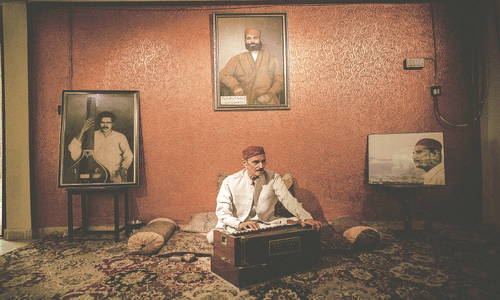
For Numair Chishti, ever since the Covid-19 virus hit Pakistan, life has taken a turn for the better. After closing his pharmacy at five in the evening, Chishti goes back home to his (recently married) wife at a decent time. “The quality of life has become better,” he says. Just a few weeks ago, he was fortunate if he came home before three in the morning.
Unlike most of the population, Chishti does not have a television at home. It was a conscious decision. “There was little need. News is depressing, and following dramas takes time and effort,” he says. Instead of a television set, his wife, who works at K-Electric, pops open the Netflix app on her cellphone and ‘binge watches’ — a term foreign to Chishti mere months back — Money Heist, Lucifer, Breaking Bad, How to Get Away with Murder, Gossip Girl, Gotham and Suits.
Chishti’s wife is a part of Netflix’s small but steadily growing subscription base in Pakistan; and the few who can’t digest routine Pakistani drama serials.
Bollywood, however, is another matter.
“If it were up to me, then I would only watch Bollywood films on Netflix,” he laughs.
With television productions grinding to a halt and with most episodes only being made weeks, if not mere days, in advance, the stockpile of content is quickly drying up. Most, if not all channels, are on the brink of repeat telecasts. How long will people put up with them?
As it happens, one day after speaking with Chishti, Bollywood films Ungli, Humpty Sharma Ki Dulhania, Kuchh Kuchh Hota Hai, Kabhi Khushi Kabhi Gham and Kal Ho Na Ho began trending on Netflix’s top ten list in Pakistan.
Seeing this sudden spike, one can surmise that binge-watchers in Pakistan are now divided between people who like youth-attracting, edgy content, and those who still prefer Bollywood films from a decade back.
Chishti acknowledges that they are an exception to the norm, as he looks at prescriptions barricaded from the crowd by four life-sized standees of cricketer Sarfaraz Ahmed — a precaution enforced by the Pakistan Rangers, who have also installed a security camera on top of a nearby pole.
The crowd, most without masks, believing themselves to be an exemption to the coronavirus, routinely swarm the stores between 4pm and 5pm; their fear of death and disease immunised by an unrelenting onslaught of news about Covid-19.
One gent, without any regard for precautionary measures, leans in dangerously close and interrupts Chishti’s interview with a rant at nothing in particular. He is angry at the government, the state of affairs of the world and life in general. Happy to be spending time at home with his family, he says he has no choice but to watch dramas, and after a while even that gets boring. His agitation is boiling over because he knows that he will run out of savings soon.
Shehzad Baig, a medical sales representative who was reapplying for a job before the pandemic broke out, says that these days their television is almost always turned on. A few months ago, the only show he fervently followed was Meray Paas Tum Ho (MPTH).
Today, he says, he’s a reluctant drama watcher with his family, citing Ehd-e-Wafa, Ruswai, Munafiq, Deewangi and the recently debuted Meher Posh, starring Danish Taimoor and real-life wife Ayeza Khan, as his current favourites.
Despite enjoying television, Baig says he would gladly give up family time for a stable job in a stable economy.
Baig, and the gent before him, are part of millions who are tuning out their woes by switching from one drama to the next, watching make-believe people tackle fake emotional turmoil on television; the ratings hike from the masses’ undivided attention is phenomenal.
TRPs AND PIPELINES

Recent Geo Entertainment shows Munafiq, Kahien Deep Jalay and Deewangi, from Abdullah Kadwani and Asad Qureshi, populate the second, third and fourth spot in the list of highest-rated shows in Pakistan with peak episode TRPs of 22.75, 20.02 and 18.85, respectively. The first and the fifth spot belong to ARY’s repeat of MPTH (at 34.47) and their 2018 hit Dil Moum Ka Diya (at 17.98).
Geo’s Meher Posh clocked in 14.9 TRP when it debuted on April 3. The debut is staggering, somewhat unprecedented, but not quite unexpected, Kadwani tells me during a late-night conference call with Qureshi.
“Munafiq wasn’t an A-list production. It worked because of its content,” Kadwani says. “Just switch around the logos of the channels, or erase them altogether, and the audience would still respond to content. Star value matters, but not as much as the story one is telling.”
Kadwani and Qureshi, although delighted by their consecutive string of successes, are fearful of what may come next.
One can surmise that binge-watchers in Pakistan are now divided between people who like youth-attracting, edgy, content, and those who still prefer Bollywood films from a decade back.
With television productions grinding to a halt, and with most episodes only being made weeks — if not mere days — in advance, the stockpile of content is quickly drying up. Most, if not all channels, are on the brink of repeat telecasts of recently aired serials (Cheekh and MPTH, now on air from ARY, immediately spring to mind).
This very predicament was foreseen by an industry executive weeks ago. A solemn, almost whispered, non-committal response to any query since then has been to pray, be safe, and wait it out.

But the question remains: for how long? And, more importantly, till how long can the channels hold audience interest.
Zahid Shareef, a dairy shop owner, has been a fan of Pakistani dramas for a while, but even he says that he is sensing the apparent lack of entertainment options. Closing the shop earlier than usual, Shareef, who does not have an internet connection at home, says that his family loses interest in shows that drag themselves on no end. It’s better to replace slacking shows with newer content, he says.
Although Shareef prefers to watch ARY or Geo, he may be inclined to watch Sabaat, Dilruba or Tadap — three recent shows from Hum TV — if he does not have options.
“With Raaz-e-Ulfat [which premiered on April 7] and Meher Posh, I would say that for now we are in the clear for a few weeks, but not months,” Qureshi says.
Successes like the ones Kadwani and Qureshi are seeing are temporary high points. Right now, Qureshi is worried about something far graver. “I’m concerned about the people who work on daily wages in the industry — the drivers, the spot boys, the assistants of assistants — people who went home with 500 or 1,000 rupees every day. The more privileged of the industry can afford to casually take this time out for R&R, to nonchalantly reflect on life. They don’t have to worry about what they bring home the next day.”
“A production has at least 50 people associated with it. We’re not saying that everyone should immediately return back to sets,” Qureshi continues, clarifying that the industry chose to willingly shut itself down to help bring down the curve of the infection. “However, a way out needs to be contemplated now, not later,” he says.

“My phone is filled with requests from actors who want to resume productions. They are willing to brave the infection, because they can’t afford not to work. Just the other day, an assistant director called me up requesting monetary help, even if it were zakat or sadqa he wouldn’t mind. There are hundreds of cases like this,” Qureshi says.
Millions are switching from one drama to the next, watching make-believe people tackle fake emotional turmoil on television; the ratings hike from the masses’ undivided attention is phenomenal.
“It’s not just the entertainment industry that suffers,” Kadwani adds, inviting a broader look into the ordeal. “Other industries are still working with limited workforces, so why can’t people in production do the same? Precautionary measures can be taken into consideration, productions can be set up with limited crew, then why is it not possible?” he asks.
Finally, Satish Anand, of Eveready Pictures, whose recent television production Jaanbaz recently debuted on PTV, feels that sooner, rather than later, people will quietly be looking up ways to secretly begin production again.
“One television anchor had already felt the brunt of social media by doing her show from her set. Production houses are just playing it safe for the time being,” he says, explaining the necessity of not painting a target over oneself by not doing anything out of the norm in this time of crisis.
Faysal Quraishi, who recently starred in the drama serial Muqaddar, attests to Anand’s insight. “Producers have begun to take this problem quite seriously,” he says. There is a definite chance that productions will start hitting floors on the very day the lockdown is lifted up, he affirms — however, there will be a drastic reduction of manpower on set. “A 50-people crew on set will be reduced to bare essentials of seven or eight technicians,” Faysal tells me.
“Until things return to normal, people like myself, Humayun Saeed, or others who have been reached out to by those in need, will try to take care of as many people as possible.” People come together in dire circumstances, Faysal tells me. The public, he says, may still see the after-effects of the month-long lockdown months from now.
In these challenging times, when everyone is barricaded at home, people look up to the entertainment industry to give them a much-needed break,” Kadwani says. “We inevitably become their ray of hope. This puts an added responsibility on us to rise to the occasion and meet the expectations of our viewers.” “Having said that,” he adds, “we, as an industry, have been affected by the pandemic and sooner or later our fresh content will also be exhausted. It is therefore as big a challenge for us.”

Looking at entertainment production from a layman’s perspective, showbiz is the last thing one considers to be serious line of work.
When mass-level lockdown is enforced — as it used to happen informally in the 1990s in Karachi — and people are stuck in their homes, entertainment is the first thing they reach out for. In the 1990s the choice was between PTV, STN and video cassette rentals. Today, it is entertainment networks, YouTube, social media or services such as Netflix.
People have a ravenous appetite for variety and freshness is a necessity. Unlike food or water, one can definitely live without it. But for how long?
Published in Dawn, ICON, April 12th, 2020



































